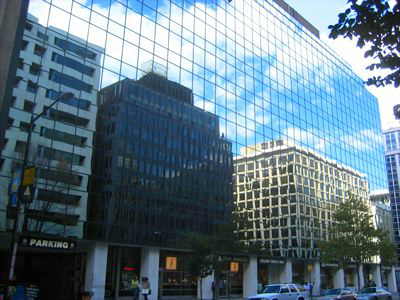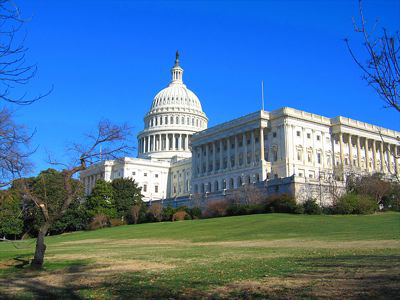No Light Rail in Vancouver!
Special Interest Lobbys and Big Government

The Washington Post has run a fascinating series of twenty-
My impression is that the series was not run in the print version of the paper; instead, it is more like a blog, with one lengthy entry per day accompanied by photos and videos, and giving people the opportunity to comment. Some of the comments came from several of the leading figures in the articles.
Another way of looking at the series is a glorification of one particular lobbyist, and several of the commenters obviously viewed it that way. They called the lobbyist a “corporate fascist” (even though his main clients were universities) and proposed various laws that would somehow end all lobbying and venality in DC.

Lobbyist habitat: K Street in Washington.
Flickr photo by askpang.
The interesting thing to me is that the hero (or antihero) of the tale apparently
invented lobbyist-
So who do we blame for this? The lobbyist? If so, the problem might be solved by banning lobbying or mandating more “transparency” in lobbying (which the antihero of the story supports).
Or shall we blame the universities, corporations, or whatever that hired the lobbyists? If so, the problem might be solved by forbidding public agencies from spending public funds, and strictly regulating expentitures by private corporation, on lobbying.

Who is the enemy here?
Flickr photo by husar.
Or should we blame Congress? If so, the problem might be solved with campaign finance reform.
The problem is that none of these are to blame, at least not by themselves. Instead, the real problem is the idea of big government — the idea that government can allocate resources efficiently. Once you accept this idea, you create and support the institutions that naturally lead to lobbying firms and the groups that hire them.
If government weren’t funding agricultural research, universities wouldn’t be tempted to lobby to get “their share” of research funds. If government weren’t funding transit, transit agencies wouldn’t be tempted to lobby to get “their share” of transit funds. And so forth.
Does your city have a lobbyist? Probably. How about your transit agency? Almost certainly, at least if it is seeking funds for rail transit. Does your state highway division? Probably not, because federal highway funds are given to the states using a strict formula — each state gets a fixed amount, so they have no incentive to lobby for more. (Though they might hire a lobbyist every six years, when Congress revisits the formula.)
As a result, any effort to solve the problems of lobbying by regulating lobbyists or campaign finance are doomed to fail — just as all the campaign finance laws enacted in the last few decades have been followed by more money spent on lobbying and political campaigns.
The best solution is to shrink the size of government. The second-
4
Trackback • Posted in News commentary
Reprinted from The Antiplanner